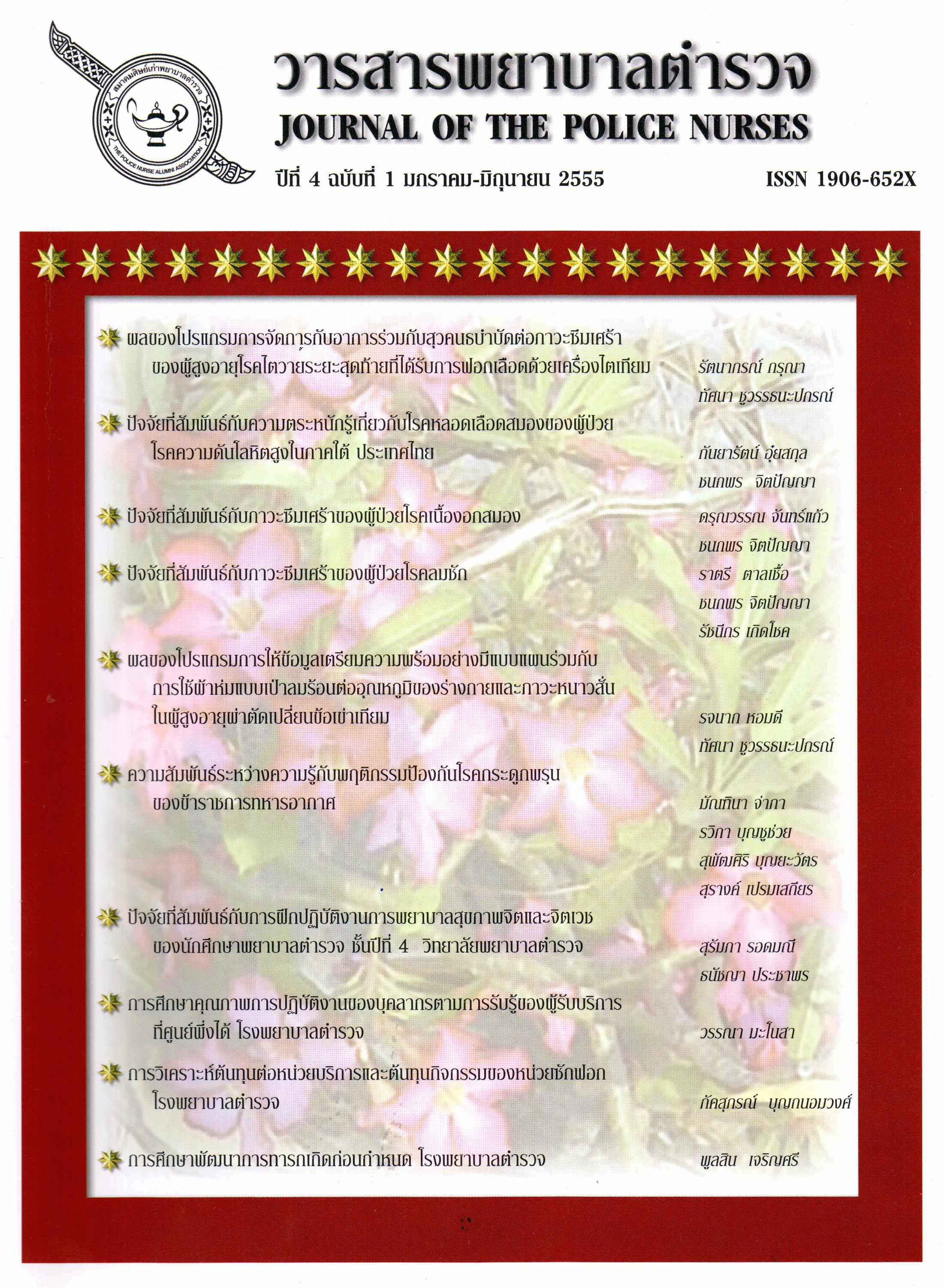ปัจจัยที่สัมพันธ์กับภาวะซึมเศร้าของผู้ป่วยโรคลมชัก
Keywords:
ผู้ป่วยโรคลมชัก, ภาวะซึมเศร้า, Patients with epilepsy, depressionAbstract
บทคัดย่อ
การวิจัยครั้งนี้มีวัตถุประสงค์เพื่อศึกษาภาวะซึมเศร้าและปัจจัยที่สัมพันธ์กับภาวะซึมเศร้าของผู้ป่วยโรคลมชัก ได้แก่ เพศ การสนับสนุนทางสังคม การรับรู้ตราบาป การจัดการตนเอง ความร่วมมือในการใช้ยาและสมรรถนะแห่งตน ตัวอย่าง คือ ผู้ป่วยโรคลมชักทั้งเพศชายและเพศหญิง ที่มารับการตรวจที่แผนกผู้ป่วยนอก คลินิกโรคลมชัก ของโรงพยาบาลจุฬาลงกรณ์ สภากาชาดไทย จำนวน 90 ราย ที่ได้รับการเลือกแบบเฉพาะเจาะจง เครื่องมือที่ใช้ในการวิจัย คือ แบบสอบถามข้อมูลส่วนบุคคล แบบสอบถามการสนับสนุนทางสังคม แบบสอบถามการรับรู้ตราบาป แบบสอบถามการจัดการตนเอง แบบประเมินความร่วมมือในการใช้ยา แบบประเมินสมรรถนะแห่งตน และแบบประเมินภาวะซึมเศร้า ที่ผ่านการตรวจความตรงตามเนื้อหาโดยผู้ทรงคุณวุฒิ และหาค่าความเที่ยงโดยการใช้สัมประสิทธิ์แอลฟาครอนบาคได้เท่ากับ .83, .89, .78, .71, .89, และ .77 ตามลำดับ วิเคราะห์ข้อมูลโดยใช้ ค่าเฉลี่ย ส่วนเบี่ยงเบนมาตรฐาน ค่าสถิติไคสแควร์ และค่าสัมประสิทธิ์สหสัมพันธ์พอยท์ไบซีเรียล
ผลการวิจัยสรุปได้ดังนี้
1. ร้อยละ 62.2 ของผู้ป่วยโรคลมชักมีภาวะซึมเศร้า
2. การรับรู้ตราบาปมีความสัมพันธ์ทางบวกกับภาวะซึมเศร้าของผู้ป่วยโรคลมชักอย่างมีนัยสำคัญทางสถิติที่ระดับ .05 (rpb=.359)
3. การสนับสนุนทางสังคม(rpb =-.211) และสมรรถนะแห่งตน( rpb=-.405) มีความสัมพันธ์ ทางลบกับภาวะซึมเศร้าของผู้ป่วยโรคลมชักอย่างมีนัยสำคัญทางสถิติที่ระดับ .05
4. เพศ การจัดการตนเอง และความร่วมมือในการใช้ยาไม่มีความสัมพันธ์กับภาวะซึมเศร้าของผู้ป่วยโรคลมชักที่ระดับ.05
Factors Related to Depression in Adult Patients with Epilepsy
Abstract
The purpose of this correlational research was to study depression and factors related to depression in adult patients with epilepsy including gender, social support, stigma, self-management, medication adherence, and self-efficacy. The sample consisted of 90 epileptic patients both male and female who attended at epileptic clinic of Chulalongkorn Memorial Hospital. The research instruments were: a demographic questionnaire, a social support questionnaire, a stigma questionnaire, a self–management questionnaire, a medication adherence questionnaire, a self-efficacy questionnaire, and a depression questionnaire. All instruments were tests for content validity by a panel of experts. The reliability of the instruments tested by Cronbach’s Alpha were .83, .89, .78, .71, .89, and .77, respectively. Data were analyzed using mean, standard deviation, point biserial correlation, and Chi-square test.
The Major findings were as follows:
- Most (62.2%) of the patients showed depression.
- Stigma (rpb=.359)was positively significant related to depression at the level of .05.
- Social support(rpb =-.211) and self-efficacy ( rpb =-.405) were negatively significant related to depression at the level of .05
- Gender, self-management, and medication adherence were not significantly related to depression at the level of .05
Downloads
Downloads
How to Cite
Issue
Section
License
ผลงานที่ได้ตีพิมพ์แล้วจะเป็นลิขสิทธิ์ของวารสารพยาบาลตำรวจ



